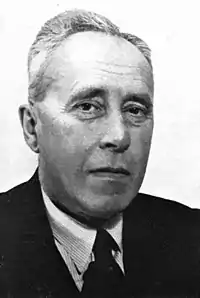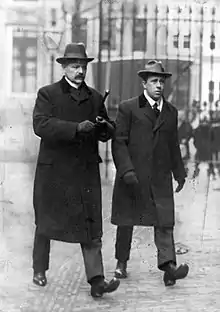Johan Huizinga
Johan Huizinga (Dutch: [ˈjoːɦɑn ˈɦœyzɪŋɣaː]; 7 December 1872 – 1 February 1945) was a Dutch historian and one of the founders of modern cultural history.
Johan Huizinga | |
|---|---|
 | |
| Born | 7 December 1872 Groningen, Netherlands |
| Died | 1 February 1945 (aged 72) De Steeg, Netherlands |
| Occupation(s) | Historian, professor, writer |
| Academic background | |
| Influences | Jacob Burckhardt |
| Academic work | |
| Discipline | History |
| Institutions | Groningen University (1905–1923) Leiden University (1915–1942) |
| Notable works |
|
Life

.jpg.webp)
Born in Groningen as the son of Dirk Huizinga, a professor of physiology, and Jacoba Tonkens, who died two years after his birth,[1] he started out as a student of Indo-European languages, earning his degree in 1895. He then studied comparative linguistics, gaining a good command of Sanskrit. He wrote his doctoral thesis on the role of the jester in Indian drama in 1897.
In 1902 his interest turned towards medieval and Renaissance history. He continued teaching as an Orientalist until he became a Professor of General and Dutch History at Groningen University in 1905. In 1915, he was made Professor of General History at Leiden University, a post he held until 1942. In 1916 he became member of the Royal Netherlands Academy of Arts and Sciences.[2]
In 1942, he spoke critically of his country's German occupiers, comments that were consistent with his writings about Fascism in the 1930s. He was held in detention by the Nazis between August and October 1942. Upon his release, he was banned from returning to Leiden. He subsequently lived at the house of his colleague Rudolph Cleveringa in De Steeg in Gelderland, near Arnhem, where he died just a few weeks before Nazi rule ended.[3] He lies buried in the graveyard of the Reformed Church at 6 Haarlemmerstraatweg in Oegstgeest.[4]
Works
Huizinga had an aesthetic approach to history, where art and spectacle played an important part. His most famous work is The Autumn of the Middle Ages (also released as The Waning of the Middle Ages or Autumntide of the Middle Ages) (1919).
Other works include Erasmus (1924) and Homo Ludens (1938). In the latter book he discussed the possibility that play is the primary formative element in human culture. Huizinga also published books on American history and Dutch history in the 17th century.
Alarmed by the rise of National Socialism in Germany, Huizinga wrote several works of cultural criticism. Many similarities can be noted between his analysis and that of contemporary critics such as Ortega y Gasset and Oswald Spengler. Huizinga argued that the spirit of technical and mechanical organisation had replaced spontaneous and organic order in cultural as well as political life.
The Huizinga Lecture (Dutch: Huizingalezing) is a prestigious annual lecture in the Netherlands about a subject in the domains of cultural history or philosophy in honour of Johan Huizinga.[5]
Family
Huizinga's son Leonhard Huizinga became a writer, including his series of tongue-in-cheek novels on the Dutch aristocratic twins Adrian and Oliver ("Adriaan en Olivier").
Bibliography
- Mensch en menigte in America (1918), translated by Herbert H. Rowen as America; A Dutch historian's vision, from afar and near (Part 1) (Harper & Row, 1972)
- Herfsttij der Middeleeuwen (1919), translated as Herbst des Mittelalters by Mathilde Wolff-Mönckeberg (1924), The Waning of the Middle Ages (1924), as The Autumn of the Middle Ages (1996) and as Autumntide of the Middle Ages by Diane Webb (2020)
- Erasmus of Rotterdam (1924), translated by Frederik Hopman as Erasmus and the Age of Reformation (1924)
- Amerika Levend en Denkend (1926), translated by Herbert H. Rowen as America: A Dutch Historian's Vision, from Afar and Near (Part 2) (Harper & Row, 1972)
- Leven en werk van Jan Veth (1927)
- Cultuurhistorische verkenningen (1929)
- In de schaduwen van morgen (1935), translated by his son Jacob Herman Huizinga In the Shadow of Tomorrow
- De wetenschap der geschiedenis (1937)
- Geschonden wereld (1946, published posthumously)
- Homo Ludens. Proeve eener bepaling van het spel-element der cultuur (1938), translated as Homo Ludens, a study of the play element in culture (1955)
- Nederland's beschaving in de zeventiende eeuw (1941). Translated by Arnold Pomerans as Dutch civilisation in the seventeenth century (1968)
- “Patriotism and Nationalism in European History”. In: Men and Ideas. History, the Middle Ages, the Renaissance. Transl. by James S. Holmes and Hans van Marle. New York: Meridian Books, 1959.
- Men and ideas. History, the Middle Ages, the Renaissance. Essays (1959). Translations by James S. Holmes and Hans van Marle of parts of Huizinga's Collected Works
- America: A Dutch Historian's Vision, from Afar and Near (translated, with introduction and notes, by Herebert H. Rowen) (Harper & Row, 1972).
See also
References
- Liukkonen, Petri. "Johan Huizinga". Books and Writers (kirjasto.sci.fi). Finland: Kuusankoski Public Library. Archived from the original on 10 February 2015.
- "J. Huizinga (1872 - 1945)". Royal Netherlands Academy of Arts and Sciences. Retrieved 21 July 2015.
- Hugenholtz, F.W.N. (November 12, 2013). "Huizinga, Johan (1872-1945)". Biografisch Woordenboek van Nederland.
- Van Ditzhuijzen, Jeannette (September 9, 2005). Bijna vergeten waren ze, de rustplaatsen van roemruchte voorvaderen. Trouw (Dutch newspaper), p. 9 of supplement.
- Huizinga-lezing, Universiteit Leiden, archived from the original on 2011-07-25
Further reading
- Willem Otterspeer: Reading Huizinga. Amsterdam University Press, 2010. ISBN 978-90-8964-180-9
- Jo Tollebeek: "At the crossroads of nationalism: Huizinga, Pirenne and the Low Countries in Europe," European Review of History (2010) 17#2 pp 187–215
- Donald R. Kelley: Fortunes of history. Historical inquiry from Herder to Huizinga. New Haven, Yale University Press, 2003. ISBN 0-300-09578-3
- Johan Huizinga 1872-1972. Papers delivered to the Johan Huizinga Conference Groningen 11-15 december 1972. Ed. by W.R.H. Koops ... [et al.] The Hague, Nijhoff, 1973. ISBN 90-247-1609-8
- Sean Farrell Moran "Johan Huizinga, The Waning of the Middle Ages, and the Writing of History," Michigan Academician XLII (2016): 410-22
“Text and Subtext in Johan Huizinga’s Writings on America.” From the Halve Maen to KLM. 400 Years of Dutch-American Exchange. Eds. Margriet Bruijn Lacy, Charles Gehring, Jenneke Oosterhof. [Studies in Dutch Language and Culture vol. 2]. Münster (Germany): Nodus Publikationen, 2008, 311-320.
External links
- Johan Huizinga The Waning of the Middle Ages
- Works by Johan Huizinga at Project Gutenberg
- Works by or about Johan Huizinga at Internet Archive
- Works by Johan Huizinga at LibriVox (public domain audiobooks)

- Johan Huizinga at The Dictionary of Art Historians
- Online version Exhibition Johan Huizinga in University Library Leiden, 1998
- Portraits of Huizinga in database of Netherlands institute for art history